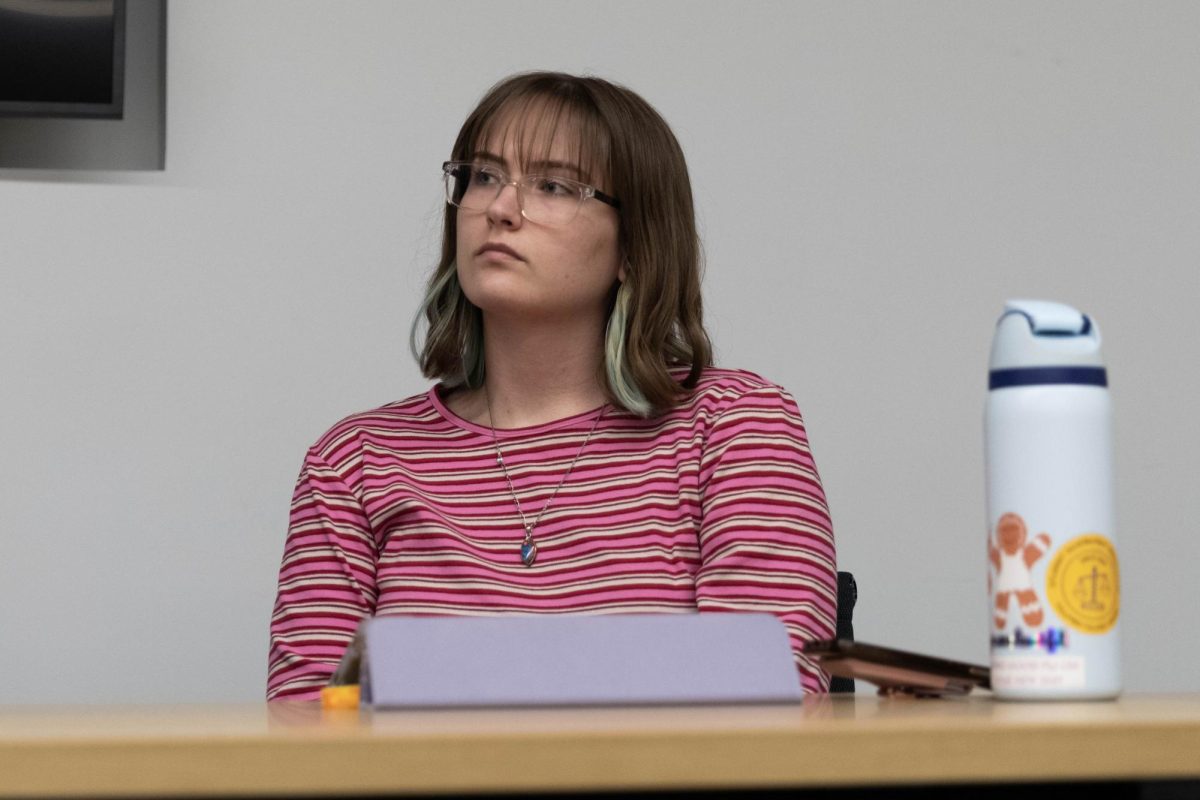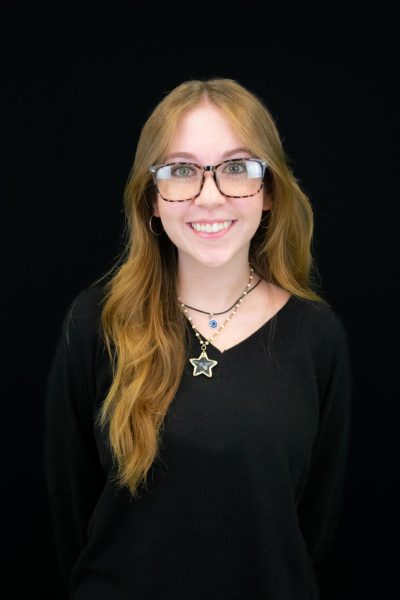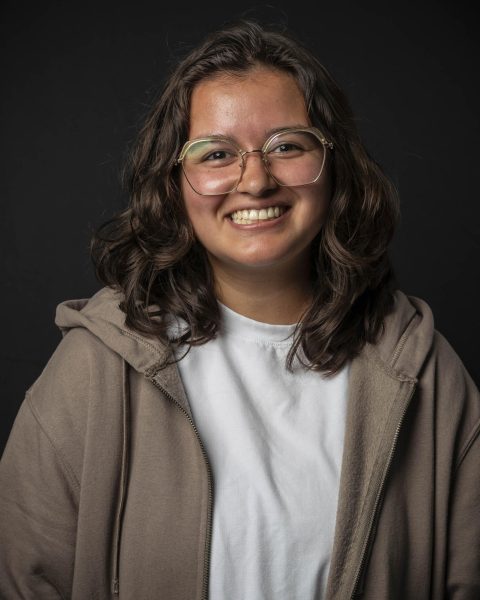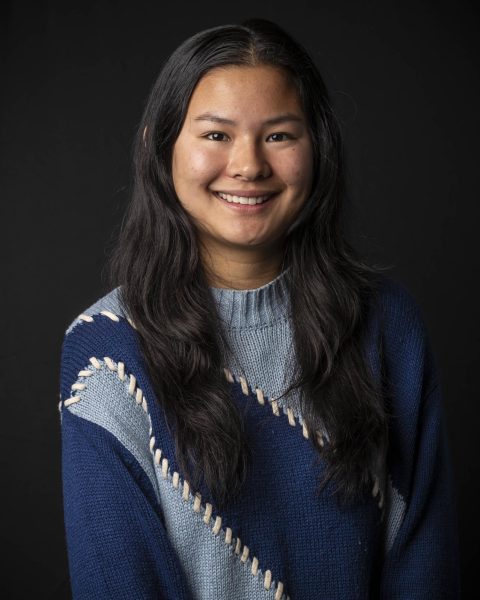The Student Government Association is holding their annual elections for leaders. All students at the college can vote online this week through SGA’s Instagram account or on the Engage app.
The elections come at a critical time for the college after President and CEO Kwang-Wu Kim recommended that the college reduce its core general education requirements to 30 credits starting in Fall 2024 and restructure the college’s schools to address the $38 million financial deficit. SGA is advocating for student interests and has the student representative from its leadership on the Board of Trustees.
Students are able to hear candidates give speeches on Tuesday, April 2 in the Student Center from 5 to 6:30pm. All students at the college are able to vote with the link on SGA’s Instagram from April 2 to April 9, or find the link through the Engage feed.
President Tyler Harding, a junior film and television major, is stepping down from president after two years. Only one candidate, sophomore fine arts major Jenna Davis, is running for president for the 2024-2025 school year.
“Students should vote for me because, despite everything that is changing at Columbia, I can truly say I care about this school and my fellow peers,” Jenna Davis told the Chronicle. With her previous experience as a tour guide, Engage leader and as a current student at the college, she “heard the experiences of a large variety of people.”
“I care about what you have to say, and I want to help find a solution,” Jenna Davis said.
Candidates for the E-board, the officers of SGA, must be an active member in SGA for at least one academic semester.
In order for Jenna Davis to secure the presidential position, students cast a “yes” or “no” vote. Jenna Davis needs to receive a majority of “yes” votes to win, Harding said.
In the case the candidate receives a majority of “no” votes, Harding said he will have to work with the SGA advisor Taylor Babbs, the coordinator of student leadership, to plan a “special election and next steps to ensure that SGA has a president for the next academic year.”
“Being able to be a part of the SGA E-Board is an incredible honor and comes with a lot of responsibility,” Harding said. “Each of the positions has different job descriptions, but the E-Board sets SGA’s goals and priorities for the year as well as has many opportunities to serve on college committees and regularly meet with various administrators of the college such as the president and vice president of Student Affairs to discuss student issues and give input on potential college-wide decisions.”
Candidates also are running for executive vice president, vice president of communications and vice president of finance.
Honor Student Senator Morgan Lawson, a first-year film and television major, and LGBTQIA+ Student Senator Amelia Lutz, a first-year CTVA major, are running for executive vice president.
Lawson told the Chronicle that she wants to “inform people about SGA’s mission statement about advocating for student needs and put a megaphone to the issues they want to see addressed.”
Lutz said she wants to “encourage the outreach of student government and student-serving offices so that students not only feel they can raise their voices for their needs, but have the avenues to go through to accomplish doing so.”
First-year Student Senator Carley Brown, a first-year communications major, and Student Employee Advocate Senator Mar Wynn, a junior film and television major, are running for vice president of communications.
Brown said that she will “speak out on student’s behalf, and I will push for the things we need.”
Wynn said they “want others to know that I only have your best interest at heart and want to be here as a resource to make your experience at Columbia a good one.”
Current Vice President of Finance Dave Palazzolo, a sophomore film and television major, is re-running for the same position. Vying to replace him are On-Campus Student Senator Ryan Sanhamel, a first-year film and television major, and Transfer Student Senator Thea Davis, a sophomore English major.
Palazzolo said if he wants to finish what he started and “continue to manage SGA’s budget in an efficient and transparent manner, providing funding to the people and places that need it the most.” Sanhamel said he wants to “create better plans for how we finance our senator’s town halls and initiatives so they can be better tailored to our individual communities that help all of Columbia College Chicago.”
Thea Davis did not respond in time for publication.
None of the seven candidates who responded to questions from the Chronicle is a commuter student from outside the city and none are transfer students. Wynn is the only one of the candidates who is a first-generation college student.
Executive Vice President Elizabeth Barajas Vasquez, a senior English major, has been on the E-Board for two consecutive years, starting as the student representative to the Board of Trustees from 2022-2023 and now executive vice president for the 2023-2024 academic school year.
“In both of my positions I was expected to elevate the student voice,” Vasquez said.
Vasquez encourages students at the college to vote for the candidates whose “message and perspective resonate with them.”
“This SGA e-board election brings new perspectives and leadership, and I really hope the students will come out and vote,” Vasquez said.
According to Harding, he believes the numbers of candidates running for an E-Board position has increased throughout the past few years, saying that this “goes to show the amount of dedication and hard work the senators and each of the candidates have contributed to SGA over the past year.”
The new E-Board members will be announced on April 9 at 5 p.m. in the 619 S. Wabash building. New members will begin their term at the start of the 2024 fall semester.
“After serving two years as president of SGA, I would like to see a new E-Board that will further continue SGA’s commitment to elevating student voices,” Harding said. “In a time filled with much uncertainty at Columbia, we need student leaders who are willing to listen and think critically to accurately speak out for and address the needs and concerns of the student body.”
The Chronicle asked the candidates several questions. The following was edited for clarity and space.
Name one to three ideas the college should consider and prioritize in addressing the $38 million financial deficit.
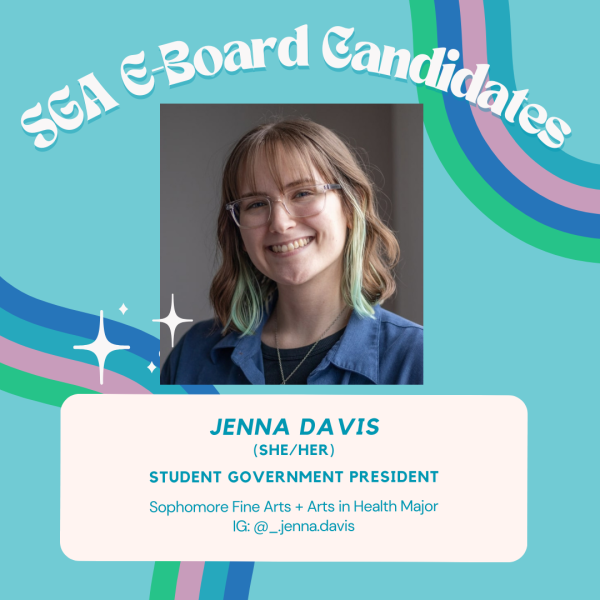
Jenna Davis, candidate for president
“An idea the college should consider in addressing the $38 million financial deficit could be reductions in catering for larger events, specifically Admitted Students Day, Parent Weekend, etc,” Davis said. “A lot of food goes to waste, which ultimately means money is wasted. Feeding the guests is important, but I believe there could be better options. For example, finding potential sponsors, which will allow Columbia to still feed guests, but also spend less money.”

Morgan Lawson, candidate for executive vice president
“The college should prioritize having a school that its current students are proud of and will advocate for,” Lawson said. “While there has been a lot of focus on incoming students and marketing schools, it is important that the school focus on listening to and prioritizing what current students want.”
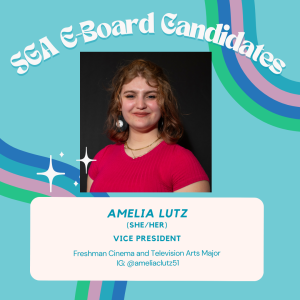
Amelia Lutz, candidate for executive vice president
“I think they should prioritize the consolidation of spaces within the school,” Lutz said. “This is a suggestion made by a PBAB [President’s Budgetary Advisory Board] member and I honestly think it’s a great way to aid students in not only finding community but also lowering space that goes unused across campus. That being said, I do firmly believe that the space consolidation should only apply to communal spaces and not to classrooms and class sizes. I think that, if done correctly, this is an effective way to cut down on the budget to help in the prolonged success of our school.”
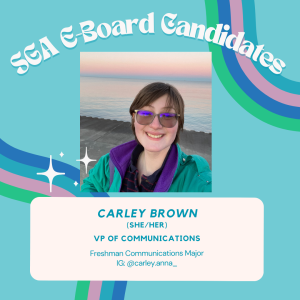
Carley Brown, candidate for vice president of communications
“Cutting administrator salaries, reducing the amount of money we spend on flashy advertisements, and really focus on student retention,” Brown said. “The students we have here originally matter the most.”
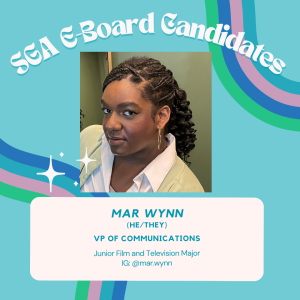
Mar Wynn, candidate for vice president of communications
“Knowing that we’re in a $38 million financial deficit only brings me stress and worry, I know this is how a lot of students and their families are feeling about these issues,” Wynn said. “I personally believe having students and possibly their families in this discussion is essential.”

Dave Palazzolo, candidate for vice president of finance
“I think the college needs to prioritize the student experience at Columbia,” Palazzolo said. “It may be somewhat easy to get overlooked considering our school doesn’t bring in money from sports teams or anything like that, but reducing the spending for student organizations and events on campus could be seriously detrimental to the experience of the student body.”
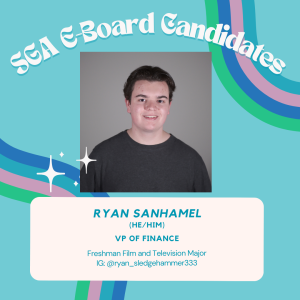
Ryan Sanhamel, candidate for vice president of finance
“The top priority should be to do what’s best for the students and the teachers that make this school what it is,” Sanhamel said. “Obviously dealing with a deficit of $38 million is going to require cuts in order to keep the school afloat but we should prioritize the student experience when doing so. I think the best course of action would be to bring together a financial plan, maybe from an outside source, that has the administration, facility, part time faculty and most important students on the same page. This plan should also accommodate student voices about what they want out of their education through these next difficult times. Working together as a team will create the best outcome and experience for everyone at Columbia College Chicago as we fix this deficit.”
What is your top concern after reading Dr. Kwang-Wu Kim’s draft advisory report?
Davis: “My top concerns after reading Dr. Kim’s draft advisory report were, first, the reduction in campus security – specifically the blue light system. As a current tour guide, this is one of the appeals for prospective students and families to ensure that they will be safe on campus,” Davis said. “My other top concern is the reduction in student affairs, specifically Columbia traditions like Manifest, Convocation and Commencement. I believe reductions in our campus’s largest events would be devastating. As art students we work so hard to showcase our talent and Manifest especially is the event we all look forward to. The Columbia campus is what it is because of the students that are here and stripping this down would take away the heartbeat of Columbia.”
Lawson: “There were two main concerns I had when reading the draft advisory report,” Lawson said. “The first was how the reduction in the number of required core classes would limit students’ possibility to be able to get credits for the Honors program. But, my more pressing concern would be the potential selling of the 624 S Michigan building, which contains an essential resource for students: the library. The resources offered by the library are wonderful and provide a more quiet space for students to work in – but there are many reasons as to why the school should keep this building.
Lutz: “I’m mostly concerned about the concept of the lack of staff available to address student concerns through student affairs,” Lutz said. “Columbia talks a lot about how important its students are to the success and foundation of the school, lowering the ability for students to speak on their concerns will show to the student body that administration doesn’t actually feel that way. Regardless of the intent, that is what I’ve heard from students across campus and, honestly, what I feel as well. As was brought up in the committee member feedback, cutting down on student aid offices will likely affect retention because students will feel as though their concerns are going unheard until the problem is likely out of hand.”
Brown: “My top concern is that this school will move so quickly in terms of cutting school spending that they will alienate students and ignore their voices,” Brown said. “I understand that we need to get a handle on the deficit, but I fail to see how slashing academics and student resources actually benefits anyone involved.”
Wynn: “Currently, I am worried about the budget cuts, as a Student Worker, I wonder what this means for student employees and does this mean that students have to worry about losing their jobs,” Wynn said. “However, the draft advisory report speaks on many other changes, which both myself and other students have to look forward to. I just want to make sure everyone is informed about the changes for them and their families can make the best decision for them.”
Palazzolo: “My top concern is the way that these changes will affect continuing students, who had created a plan based on what was previously the model for obtaining their degree, and may now have that flipped on its head by the time they graduate,” Palazzolo said.
Sanhamel: “Student representation when it comes to budget cuts, along with that programs and majors will be cut,” Sanhamel said. “These cuts to the programs could greatly affect students’ educations and overall experience at the college, along with that could also affect incoming students as cuts to these majors and programs could completely turn away new incoming students.”
Thea Davis, candidate for vice president of finance, did not respond in time for publication.
Copy edited by Jordilin Ruiz


